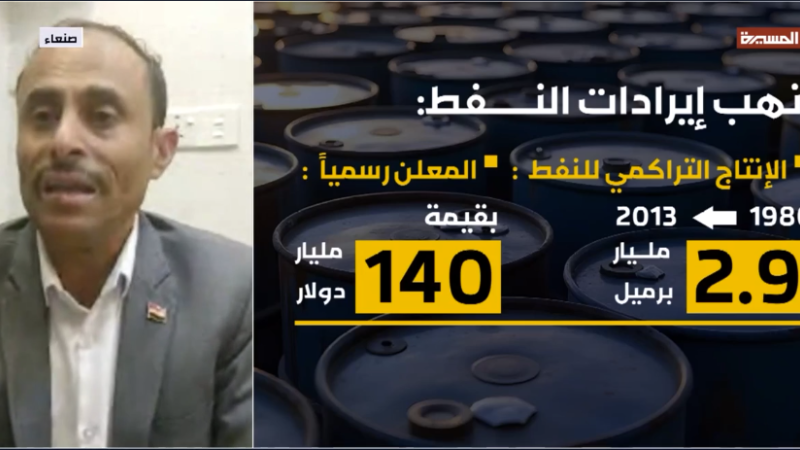Yemeni Economist: US, Saudi Arabia Systematically Looted Yemen’s Oil and Gas Wealth, Entrenching Poverty, Dependence*

News – Yemen: Economic expert Rashid al-Haddad has exposed decades of systematic looting of Yemen’s oil and gas resources, accusing the United States and Saudi Arabia of leading a complex network of exploitation in collusion with successive Yemeni governments. He said this alliance turned a resource-rich country into one of the poorest in the region, despite Yemen’s vast reserves and economic potential.
Al-Haddad explained that Washington enabled the former regime to enter oil exploration in the 1980s, particularly during the Iran–Iraq war, when the US sought to create alternative energy markets. Since then, he said, American companies have retained control over major oil fields, including blocks with reserves exceeding 600 million barrels.
He revealed that foreign operators, mainly American, imposed contracts guaranteeing themselves at least 70 percent of revenues, while Yemen was left with a marginal share. The so-called “cost oil” mechanism, he added, allowed inflated expenses to further erode Yemen’s profits. Even in the export process, Yemeni staff were excluded from oversight, leaving the country sidelined while its wealth was drained.
Al-Haddad stressed that the revenues never translated into tangible development. Instead, Yemen was saddled with $6.7 billion in foreign debt by 2015, with 80 percent of loans allocated to projects that were either stalled or fictitious. “Where are the real projects from oil and gas revenues?” he asked, noting that more than 90 percent of Yemenis remained in poverty while only 5 percent of the political elite enjoyed the benefits.
He highlighted how Saudi Arabia deliberately obstructed the development of promising oil fields, such as Harib, Tamuz, and al-Jawf, to keep Yemen economically weak and dependent. Riyadh, he said, operated through its “special committee” and local collaborators to block investment in strategic reserves.
Beyond oil and gas, al-Haddad pointed to untapped wealth in minerals, gold, marble, and limestone. He cited the al-Mahraq mountains, rich in gold, as an example of resources deliberately left idle due to corruption and foreign interference.
The economist also reviewed the collapse of Yemen’s national currency. From a value of 8 rials to the dollar in 1982, it fell to 40 in the mid-1990s, then spiraled downward following destructive policies such as uncontrolled money printing during the 1994 civil war and the 2011 unrest. He said these reckless policies fueled inflation, eroded purchasing power, and deepened poverty.
He further noted that over 200 externally financed projects were halted or failed due to corruption and bureaucratic obstruction, reflecting a governance system that prioritized foreign and elite interests over national welfare.
Despite this bleak legacy, al-Haddad emphasized that Yemen remains a land of promise: “Yemen is not a poor country, but one rich in natural and human resources. Its wealth has been systematically looted for decades, leaving its people deprived of basic necessities.” He concluded that the ongoing war and blockade are designed to maintain this cycle of dependency and prevent Yemen from achieving economic independence.
Yemen became an oil exporter in the late 1980s and started gas exports in 2009, raising hopes of prosperity. Instead, experts say, the country fell victim to foreign domination, corruption, and local elite capture. Analysts argue that the September 21 Revolution of 2014 was fueled by popular anger over this plunder, as Yemenis sought to reclaim sovereignty over their wealth and secure a dignified standard of living.
-
05:05
Gaza Ministry of Health: The toll of the Israeli aggression has risen to 70,354 martyrs, 171,030 injuries since the beginning of the aggression on Gaza
05:04
Gaza Ministry of Health: 367 martyrs, 953 wounded since the ceasefire on October 11
05:04
Gaza Ministry of Health: 6 martyrs — including 5 recovered, 15 injuries arrived at hospitals during the past 48 hours
05:04
Gaza Government Media Office: 104 cooking-gas trucks have entered the Strip out of 660 scheduled since the ceasefire, representing only 16% of actual needs
10:28
A Palestinian was killed and several others were wounded in Israeli enemy targeting of Al-Attatra roundabout in north of Gaza: Palestinian sources





